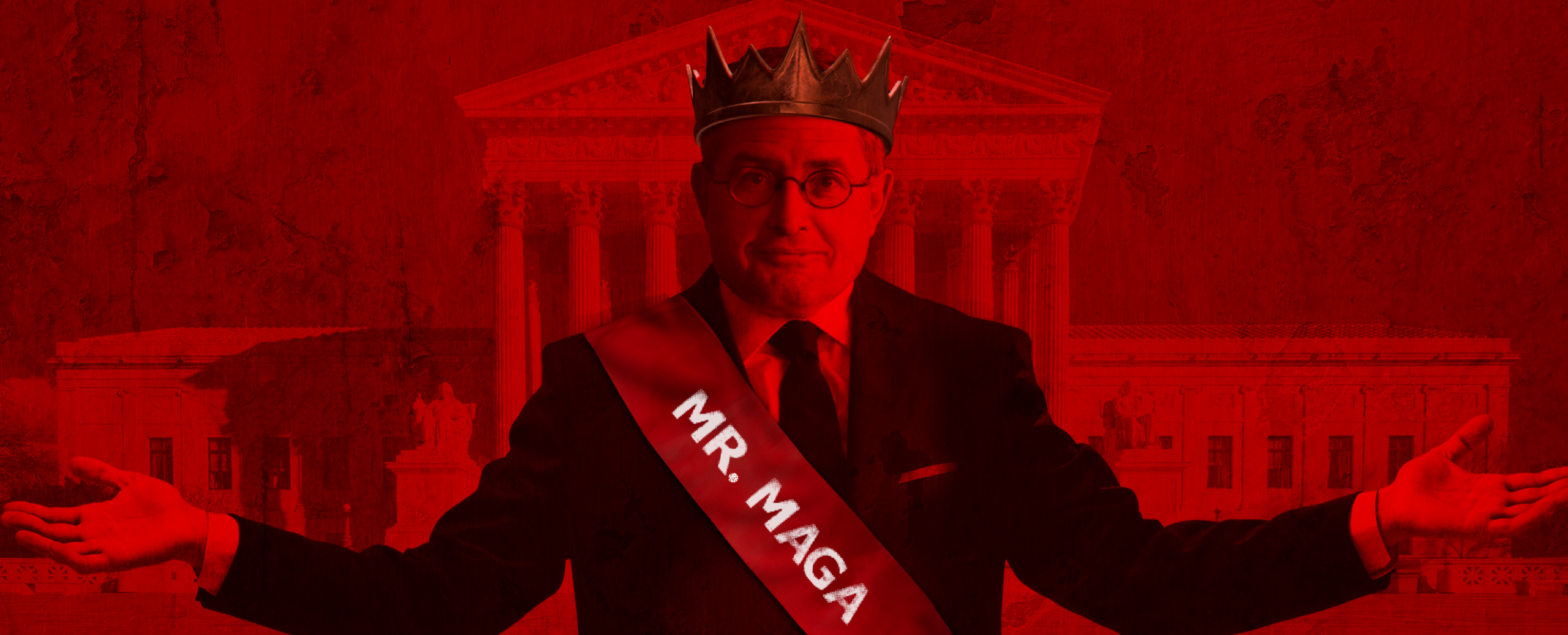Press Releases
Leonard Leo’s Decades of Corruption Driving the News

WASHINGTON, DC – New investigative reports digging into Leonard Leo’s ties to anti-abortion groups in Ohio, ethical violations, and corrupt nonprofit networks are making waves in Washington.
Ahead of the November election, new reporting from The Guardian exposed Leo’s extensive financial ties to dark money groups attempting to block Ohioans from approving a state constitutional amendment to safeguard abortion access. Building on their “We Don’t Talk About Leonard” podcast, ProPublica also revealed new details of Leo’s influence over the Supreme Court and state courts throughout the country.
The Guardian also highlighted Leo’s influence on the October Supreme Court term, and his connections to a legal challenge to the Consumer Financial Protection Bureau in front of the court. Additionally, investigative reports co-published by ProPublica and the Missoulian and ProPublica and The Guardian took a closer look at Leo’s growing influence at the state level.
More on Leo’s anti-abortion crusade, corrupt self-dealing, and judicial influence:
The Guardian: Abortion is still under threat by dark money groups that helped overturn Roe
-
- The fight for abortion access in the US continues to be threatened by the same dark-money, anti-abortion operatives that helped overturn Roe v Wade. Chief among them is the Leonard Leo-affiliated group Susan B Anthony Pro-Life America (SBA-PLA) and Alliance Defending Freedom (ADF).
-
- PWO described itself as an “Ohio-based coalition” of 48 anti-abortion groups that in less than a month launched a $5m, four-week television and social media ad campaign. A few months later, PWO committed to spending an additional $20m to combat the proposed amendment.
-
- According to the most recent Ohio financial disclosures, PWO and its affiliated Pac have received $16.9m from one of Leo’s core organizations, The Concord Fund, which also uses the name Judicial Crisis Network. Financial disclosures also revealed that PWO has received $13.5m from the Leo-linked anti-abortion group that calls itself Susan B Anthony Pro-Life America (SBA-PLA).
ProPublica: We Don’t Talk About Leonard: The Man Behind the Right’s Supreme Court Supermajority
-
- ‘After the 2008 financial crisis, Congress passed the Dodd-Frank regulatory overhaul, aimed at preventing another meltdown. [Paul] Singer became one of the law’s biggest critics. In op-eds and in speeches, he argued that the new banking rules were unworkable and that efforts to prevent banks from becoming too big to fail could in fact make the system more fragile…’
-
- ‘Leo took up the cause. According to interviews and meeting details obtained by the liberal watchdog group Accountable.US, Leo spoke with attorneys general in at least three states about a legal challenge to Dodd-Frank. He scheduled conference calls with the Oklahoma and Texas attorneys general at the time, Scott Pruitt and Abbott, respectively, to talk about what they could do about Dodd-Frank.’
The Guardian: Abortion, guns, democracy: US rights at stake as supreme court term begins
-
- “Since its inception in 2011, the CFPB has been a target of the far-right legal movement under the leadership of the co-chairman of the Federalist Society Leonard Leo. Seven amicus briefs supporting the CFPB challenge have been lodged with the supreme court by groups associated with Leo.”
-
- ‘“This is a well-coordinated campaign by predatory lenders aligned with rightwing groups who want to bring down a regulatory body standing up for everyday Americans,” said Liz Zelnick of Accountable.US, a nonpartisan anti-corruption watchdog.’
ProPublica & The Guardian: Trump’s Court Whisperer Had a State Judicial Strategy. Its Full Extent Only Became Clear Years Later.
-
- “In July 2015, Wisconsin’s Supreme Court shielded Gov. Scott Walker, then a rising Republican star with aspirations to the presidency, from a criminal investigation. The court’s conservative majority halted the probe into what prosecutors suspected were campaign finance violations. One of the deciding votes was cast by Justice David Prosser…Another vote for Walker came from Michael Gableman, a justice who had also waged a contentious campaign for his Wisconsin Supreme Court seat.”
-
- “In 2008, in a racially charged challenge to the state’s first Black Supreme Court justice, Leo himself raised money for Gableman, according to a person familiar with the campaign. Leo passed along a list of wealthy donors with the instructions to “tell them Leonard told you to call,” this person said. All those people gave the maximum. Gableman won, the first time an incumbent was unseated in Wisconsin in 40 years.’
-
- ‘Then in 2011, state GOP operatives turned to Leo to boost Prosser. They hoped he would help them raise $200,000 for “a coalition to maintain the Court,” the emails show. Prosser won, by half a percentage point.’
The Missoulian & ProPublica: Architect of US court shift used Montana as stepping stone
-
- ‘[Former Montana Solicitor General Lawrence] VanDyke had been a Federalist Society member since his time at Harvard Law…Despite his skill and credentials, VanDyke quickly alienated colleagues at the Montana Attorney General’s office. Black said VanDyke had little appetite for the bread-and-butter state court cases that came with the job…VanDyke was excited by hot-button issues, often happening out of state.”
-
- ‘For VanDyke, state solicitor general was a stepping stone on the judiciary path, especially with Leo’s hand at his back. In 2014, he quit the Montana attorney general’s office to run for state Supreme Court, in what turned out to be a bitter contest inflamed by record independent expenditures. The Republican State Leadership Committee, which received funding from JCN, spent more than $400,000 to support VanDyke.’
-
- ‘After Montana, VanDyke landed in Nevada as solicitor general under Adam Laxalt, an ally of Leo’s. In the Trump administration, VanDyke worked briefly for the Justice Department before the president nominated him to be a judge on the 9th U.S. Circuit Court of Appeals. Less than a year later, Trump released a fourth list of potential Supreme Court nominees. More than a third of the names were alumni of state attorneys general offices. The final name on the list: Lawrence VanDyke.’
